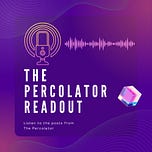In this week’s brew:
The Subtle Art of Making Decision by Neelendra Nath
Visual Thought of the Week featuring creative by @elliottaleksndr
Old fashioned way to stand out - a twitter thread by Sahil Bloom
POST
The Subtle Art of Making Decisions
The decisions that we make are essentially the steering wheel of our lives. Yet, we are never really taught how to make good decisions. Decision makings isn’t a skill in itself, it is the ability to effectively use a series of skills, frameworks and tools in unison to reason the situation and respond rationally.
Quite early in the human history thinkers identified the importance of decision-making process and spent much time understanding it. All of them concurred that in some way or other, a decision should be an outcome of rational and deliberate reasoning. If that be true, every person facing the same set of dilemmas will take exactly the same decisions. But that doesn't happen. More often than not system one thinking – the intuition – plays a much bigger role than rationality in our decisions. Intuitions indeed are based on our long term learning and speed up the decision making process by helping us make judgments without conscious consideration. But it fails in factoring for the second order effect and long term consequences. Thus, often the intuitive decisions turn out to be sub optimal.
Good decisions have the power to change the world, or at least changing the world for ourselves. We shouldn’t be making them subconsciously.

Understanding Decision Making
Decisions are an integral part of our lives. We make hundreds of them everyday and they affect us in more ways than we recognize. What we eat on a particular day, might seem like a trivial decision but if we keep making bad decisions about it every day then that can be detrimental to our health. Thus, it is important to be conscious of both, the decisions that we make and the pattern of our decisions. But, it is also important to recognize that not all decisions that we make will be important or have significant consequences, so that we are not always bogged down by the burden of decision making.
One way of organizing our decisions and have a quick method to identify which requires what amount of attention, is the decision matrix. The decision matrix groups all the decisions in four quadrants distributed by two axis – reversibility and consequentiality:
Irreversible & Inconsequential
Irreversible & Consequential
Reversible and Inconsequential
Reversible and Consequential
This matrix can be extremely helpful in determining how much time, effort and attention we would like to spend on each of the decision. Something which is inconsequential requires our minimal attention. Those which are consequential but reversible, can be our playing ground to run experiments and be innovative in our approach. It is the consequential and irreversible ones which demand our complete focus.
Why we make bad decisions?
Making good decision is not a function of intelligence, or at least of the intelligence alone. Extremely intelligent people can make terrible decisions.
The source of bad decisions can be many but at the core of it lies the fact that the society that we live in has designed the learning process in a manner where we gain expertise in a narrow space of knowledge, whereas the world that we live in is essentially multidisciplinary. Thus, we can have a great judgement in a niche and make excellent decisions about them, while making really silly decisions about everything else. Look around at all the extremely intelligent people you know and then look at the terrible personal finance decisions that they make.
Sources of bad decisions can be:
Unintentional Stupidity: We, more often than we would like to acknowledge, act in very stupid manner. Some of this stupidity is born out of biases that we hold and other could simply be circumstantial – being busy, being tired or being extremely focused on one thing. Bad influence or mob mentality can also be sources for stupidity.
Bad Knowledge: We might be very good with our process of making decision, and yet go completely wrong if the information we have is itself bad.
Bad Process: We might have all the right information needed to make a good decision, but if our process of decision making is not correct we will end up with bad decision.
Validation: We crave validation and want to do things which have good optics, acceptable politics and peer approval. This need for validation can often lead us in to making bad decisions even when we know better.
How to improve decision making skills?
Three things that essentially go in to making decisions: information that we have, process that we follow and our perceived consequences of the decisions that we are making.
To improve our decision-making skills, we need to improve each of them.
Our perceived consequences of the decision is what dictates the amount of time and effort we are going to put into making that decision. If we wrongly assume the decision to be inconsequential, it is unlikely that we will be very mindful while making it. Improving our second order thinking can be the key to gaining this capability.
Second is the information that we have. It is important that we be very mindful of the information which we are using to make decisions. We often, intuitively, favour one decision over other. This can lead to a level of bias in how we go about collecting information i.e. ignoring the one which doesn’t support our innate want. Having all the information and treating them with the importance that each of them deserve, is key to arriving at a good decision.
Third, is the decision making process. Even if we are acutely aware of the consequences and have the right information, and yet do not know how to process them then it is unlikely that we will come up with a good decision. Why that happens? Because more often than not, instead of consciously processing our decisions, we let our intuition make judgments. We should improve our understanding of thinking processes and mental models to make ourselves capable of making good decisions.
A blue-print to effective decision making
Well, there is none. If we have had one, no body would be making bad decisions. But, certainly there are steps, if employed properly can minimize the probability of going terribly wrong with the decisions that we make.
In their book, Smart Choices: A Practical Guide to Making Better Decisions, authors John Hammond, Ralph Keeney and Howard Raiffa suggest eight steps to make good decisions:
Define the problem that requires a decision, properly and precisely
Identify all the criteria to evaluate the situation and decision
Imagine all the alternatives that exist
Evaluate the consequences of each of them
Understand the trade-offs associated with choosing one over other
Seek further clarification or evidence for the uncertainties
Honestly evaluate your own risk capacity
Consider all the decisions that would be linked with this one decision
Be mindful that not all decisions require this kind of rigorous exercise before taking them. Consider the decision matrix; these eight steps are probably what would be employable while dealing with the decisions which are irreversible and consequential.
No matter what we do, there will always be some decisions which, in the hind sight we would realize were not the best one. A very important aspect of decision-making is taking responsibility for those decisions. In the end, it is our decisions which makes us who we are.
WEEKLY ROUNDUP
Visual Thought of the Week

A Twitter thread on Old Fashioned way to Stand Out by Sahil Bloom

SPONSORED
To stay updated and interesting read everyday, I am using Refind. They curate posts from many sources and send it directly to your inbox based on your selected topics. It is free to subscribe. Give it a shot and I am sure you will find something of your interest.











